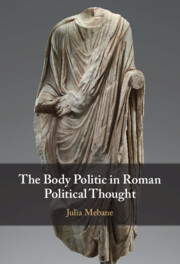Book contents
- The Body Politic in Roman Political Thought
- The Body Politic in Roman Political Thought
- Copyright page
- Dedication
- Contents
- Acknowledgments
- Introduction
- Chapter 1 The Divided Body Politic
- Chapter 2 The Sick Body Politic
- Chapter 3 The Augustan Transformation
- Chapter 4 Julio-Claudian Consensus and Civil War
- Chapter 5 Addressing Autocracy under Nero
- Conclusion
- Works Cited
- Index Locorum
- Index
Chapter 4 - Julio-Claudian Consensus and Civil War
Published online by Cambridge University Press: 01 February 2024
- The Body Politic in Roman Political Thought
- The Body Politic in Roman Political Thought
- Copyright page
- Dedication
- Contents
- Acknowledgments
- Introduction
- Chapter 1 The Divided Body Politic
- Chapter 2 The Sick Body Politic
- Chapter 3 The Augustan Transformation
- Chapter 4 Julio-Claudian Consensus and Civil War
- Chapter 5 Addressing Autocracy under Nero
- Conclusion
- Works Cited
- Index Locorum
- Index
Summary
Chapter 4 identifies the Tiberian era as the moment when Roman writers started representing the establishment of the Principate as a civic rebirth. Benefiting from the hindsight granted by half a century of peace, Manilius, Velleius Paterculus, and Valerius Maximus constructed a triumphant narrative that equated the acquisition of a head of state with the end of civil war. Yet their imagery also betrayed growing concern over the succession, a weakness encoded in the fabric of the Principate’s Republican façade. This problem became acute with the violent assassination of Caligula, which exposed the vulnerability of a political community dependent on one man for its survival. Those writing under Claudius, including the Elder Seneca, Philo of Alexandria, and Curtius Rufus, consequently began returning to imagery of a sick, aged, and headless body politic. Their revival of this tradition confirmed that the Augustan restoration was not a permanent solution. With each transfer of power came a new head of state who could harm or heal the body under his care.
Keywords
- Type
- Chapter
- Information
- The Body Politic in Roman Political Thought , pp. 131 - 162Publisher: Cambridge University PressPrint publication year: 2024

